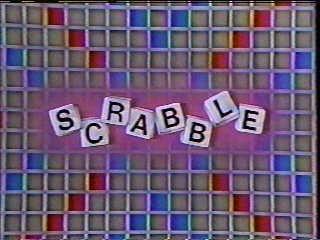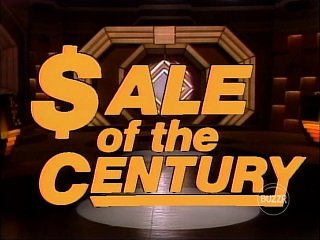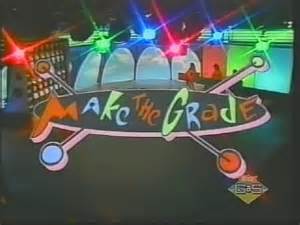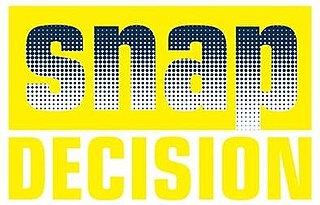Related Research Articles

Hollywood Squares is an American game show in which two contestants compete in a game of tic-tac-toe to win cash and prizes. The show piloted on NBC in 1965 and the regular series debuted in 1966 on the same network. The board for the game is a 3 × 3 vertical stack of open-faced cubes, each occupied by a celebrity seated at a desk and facing the contestants. The stars are asked questions by the host and the contestants judge the truth of their answers to gain squares in the right pattern to win the game.

Name That Tune is an American television music game show. Originally created and produced by orchestra conductor Harry Salter and his wife Roberta Semple Salter, the series features contestants competing to correctly identify songs being played by an on-stage orchestra or band.

Supermarket Sweep is an American television game show. The format combines an ordinary team-based quiz show with the novel concept of a live, timed race through a supermarket. In the timed race, cameras follow the teams with shopping carts through a large vacated supermarket with several aisles; the value of items thrown into the cart determine the winning team. The original show was broadcast on ABC from December 20, 1965, to July 14, 1967. Later seasons aired on Lifetime from February 5, 1990, to June 16, 1995, and later from April 3, 2000, to May 23, 2003, with reruns airing until March 26, 2004. Another version of the show aired from October 18, 2020, to January 30, 2022, also on ABC.

Beat the Clock is an American television game show that involves people trying to complete challenges to win prizes while faced with a time limit. The show was a creation of Mark Goodson-Bill Todman Productions.

Scrabble is an American television game show based upon the Scrabble board game. Muriel Green of Exposure Unlimited developed the idea for a television game show based upon the board game concept. During 1983, Green convinced Selchow and Righter, who at that time owned the Scrabble board game, to license Exposure Unlimited to produce the game show. Exposure Unlimited co-produced the show with Reg Grundy Productions, and licensed the show to NBC. Scrabble aired on NBC from July 2, 1984, to March 23, 1990, and again from January 18 to June 11, 1993. Chuck Woolery hosted the program. Jay Stewart was the announcer for the first year. Charlie Tuna replaced him in the summer of 1985 and remained through the original run and the entirety of the 1993 revival.

Wipeout is an American game show that aired from September 12, 1988, to June 9, 1989, with Peter Tomarken as host. The series was produced by Dames-Fraser Productions, and was distributed in first-run syndication by Paramount Domestic Television.

Sale of the Century is an American television game show that originally debuted on September 29, 1969, on NBC daytime. It was one of three NBC game shows to premiere on that date, the other two being the short-lived game shows Letters to Laugh-In and Name Droppers. The series aired until July 13, 1973, and a weekly syndicated series began that fall and ran for one season.
The Joker's Wild is an American television game show that aired at different times between 1972 and 2019. In the show, contestants answer questions based on categories determined randomly by a mechanism resembling a slot machine. The show's title refers to the game's slot-machine mechanism also having jokers.

Make the Grade is a children's game show that aired from October 2, 1989, to September 14, 1990, on Nickelodeon.

Bumper Stumpers is a Canadian game show in which two teams of two players competed to decipher letter puzzles presented as fictional vanity licence plates.
Shafted was a British game show that aired on ITV from 5 to 26 November 2001 and was hosted by Robert Kilroy-Silk.
Illinois Instant Riches is a lottery game show airing in the state of Illinois, as well as nationally on Chicago-based Superstation WGN-TV. The show was hosted by Mark Goodman, with Linda Kollmeyer as his co-host and Bill Barber as announcer.

Gameshow Marathon is an American television program which aired on CBS from May 31 to June 29, 2006. It is based on the United Kingdom series Ant & Dec's Gameshow Marathon which aired on ITV in 2005. It also aired in Canada on CTV.
Sale of the Century is an Australian prime time game show that aired on the Nine Network from 14 July 1980 to 29 November 2001. It is based on both Great Temptation that aired from 1970 to 1974 and on the original Sale that first aired in the United States from 1969 to 1973. The Australian format of Sale has since been used internationally, including in a revived US version that aired from 1983 to 1989.

Wheel of Fortune is a British television game show based on the American show of the same name created by Merv Griffin. Contestants compete to solve word puzzles, similar to those used in Hangman, to win cash and prizes. The title refers to the show's giant carnival wheel that contestants spin throughout the course of the game to determine their cash and/or prizes.
Temptation: The New Sale of the Century is an American syndicated television game show loosely based on both the original Australian and American Sale of the Century versions, plus the 2005 Australian version, also titled Temptation. The show began airing in syndication on September 10, 2007, with the last first-run episode airing on May 23, 2008. Reruns continued until September 5, 2008.

Merv Griffin's Crosswords is an American game show based on crossword puzzles. The show was created by its namesake, Merv Griffin, who died shortly after beginning production on the series. Ty Treadway was the host, and Edd Hall was the announcer.

Break the Bank is a game show created by Richard S. Kline. It aired in syndication from September 16, 1985 to June 20, 1986, with repeats airing until September 12. It was not related to two previous shows by the same name.
Wipeout was an Australian game show that aired on the Seven Network from 15 February 1999 to 24 November 2000. The show was based on the original American series of the same title and was hosted by Tony Johnston. This version was the only one to use children as contestants, and in turn used points instead of dollars due to a law in Australia and Europe which prohibits children from winning money on game shows. After the show was cancelled, it was rerun until 2004.

Snap Decision is a half-hour American comedy game show featuring David Alan Grier as the host. The show airs on Game Show Network and is also syndicated on Tornante-Sinclair stations. The game show premiered on August 7, 2017.